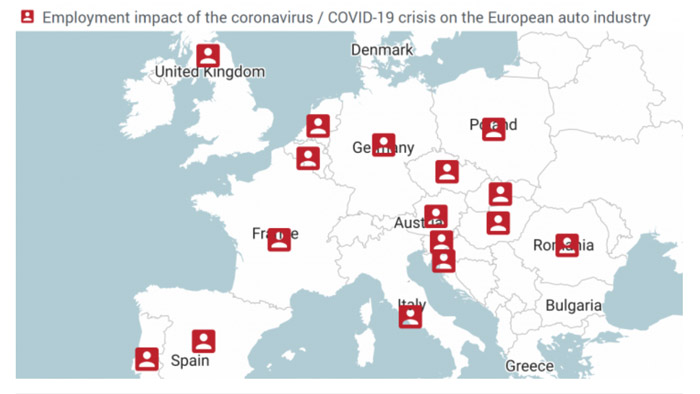
ACEA assesses impact on jobs in EU’s auto industry due to COVID-19
The jobs of at least 1,110,107 Europeans working in automobile manufacturing are affected by factory shutdowns as a result of the COVID-19 crisis, according to data compiled by the European Automobile Manufacturers’ Association (ACEA). This figure only refers to those people directly employed by car, truck, van and bus manufacturers – the impact on the wider automotive supply chain is even more critical.
EU-wide production losses due to factory shutdowns amount to at least 1,231,038 motor vehicles so far. The average shutdown duration is 16 working days at the moment. Production losses are set to increase if shutdowns are extended or additional plants are brought to a halt.
ACEA has published this information in two interactive maps visually showing the impact on the automobile industry for each of the 27 EU member states plus the United Kingdom, both in terms of the number of employees affected and lost production in units.
In total 2.6 million direct manufacturing jobs are provided by the EU automotive industry, with vehicle makers operating 229 vehicle assembly and production plants across the region. The wider auto sector provides indirect and direct jobs for 13.8 million people in the European Union.
“Right now, the primary concern of ACEA and all its members is to manage the immediate crisis facing the auto industry, which has essentially come to an abrupt halt – something the sector has never experienced before,” said ACEA Director General Eric-Mark Huitema.
“Our first priority is to protect the health and jobs of the almost 14 million Europeans who work directly or indirectly in our sector.”
On 25 March 2020, the presidents of ACEA, the European Association of Automotive Suppliers (CLEPA), the European Tyre & Rubber Manufacturers’ Association (ETRMA) and the European Council for Motor Trades and Repairs (CECRA), wrote a letter to the President of the European Commission, Ursula von der Leyen, about the implications of the COVID‐19 crisis on the automotive sector and the measures that the European Commission could potentially take in this respect.
“As we direct our focus and resources to addressing these short‐term issues, other activities inevitably suffer. No production, development, testing or homologation work occurs for the time being. This upsets the plans we had made to prepare ourselves for complying with existing and future EU laws and regulations within the applicable deadlines set in these regulations. We believe therefore that some adjustment would need to be made to the timing of these laws,” they wrote.














